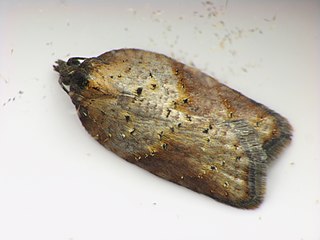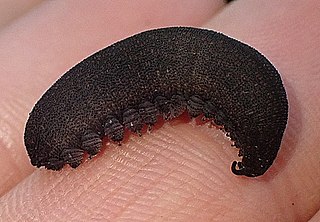Related Research Articles

Fors Clavigera: Letters to the Workmen and Labourers of Great Britain was the name given by John Ruskin to a series of letters addressed to British workmen during the 1870s. They were published in the form of pamphlets. The letters formed part of Ruskin's interest in moral intervention in the social issues of the day on the model of his mentor Thomas Carlyle.

Chlidanotinae is a subfamily of moths in the family Tortricidae.

The Cochylini are a tribe of tortrix moths. It used to be classified as the subfamily Cochylinae.

Limacia clavigera, sometimes known by the common name orange-clubbed sea slug, is a sea slug, a species of dorid nudibranch. It is a marine gastropod mollusc in the family Polyceridae.
Planostocha is a genus of moths belonging to the subfamily Tortricinae of the family Tortricidae.

The Atteriini are a tribe of tortrix moths.

The Euliini are a tribe of tortrix moths.

The Tortricini are a tribe of tortrix moths.

Reishia clavigera is a species of sea snail, a marine gastropod mollusk in the family Muricidae, the murex snails or rock snails.
Ectopatria clavigera is a moth of the family Noctuidae. It is found in Western Australia.

Caño Cristales is a Colombian river located in the Serranía de la Macarena, an isolated mountain range in the Meta Department. It is a tributary of the Guayabero River, itself a part of the Orinoco basin. Caño Cristales was found in 1969 by a group of cattle farmers. The river is commonly called the "River of Five Colors" or the "Liquid Rainbow," and is noted for its striking colors. The bed of the river from the end of July through November is variously colored yellow, green, blue, black, and especially red, the last caused by Rhyncholacis clavigera plants on the riverbed. In recent years, the river has become a tourist destination; there were more than 16,000 visitors in 2016.
Planostocha cumulata is a species of moth of the family Tortricidae first described by Edward Meyrick in 1907. It has a wide distribution, ranging from India, Sri Lanka, Nepal, Myanmar, Korea, Thailand, Brunei and New Guinea to Queensland in Australia. The habitat consists of lowland to montane areas.

Mithrodia clavigera is a species of tropical starfish in the family Mithrodiidae. It has pale flesh tone with large brick-red patches. Its Specimens preserved in alcohol become uniformly white.
Planostocha curvosa is a species of moth of the family Tortricidae. It is found in Indonesia, where it has been recorded from the Maluku Islands.

Peripatopsis clavigera, the Knysna velvet worm, is a species of velvet worm in the Peripatopsidae family. This species has 16 pairs of legs and ranges from 4 mm to 17 mm in length. Peripatopsis clavigera is found in subtropical or tropical moist montane forests of the Diepwalle Nature Reserve in South Africa.
Peripatopsis edenensis is a species of velvet worm in the family Peripatopsidae. This species is a clade in the P. clavigera species complex. This species has 16 pairs of legs, varies from slate black to charcoal, and ranges from 4 mm to 17 mm in length. Also known as the Eden velvet worm, this species is found in the Garden of Eden Nature Reserve and in forests along the coast of Western Cape province in South Africa.
Peripatopsis ferox is a species of velvet worm in the family Peripatopsidae. This species is a clade in the P. clavigera species complex. This species has 17 pairs of legs, varies from slate black to brown, and ranges from 17 mm to 28 mm in length. Also known as the Wilderness velvet worm, this species has an extensive distribution across many patches of forest in Western Cape province in South Africa.
Peripatopsis mellaria is a species of velvet worm in the family Peripatopsidae. This species is a clade in the P. clavigera species complex. This species has 17 pairs of legs, varies from slate black to charcoal, and ranges from 11 mm to 20 mm in length. Also known as the Outeniqua velvet worm, this species is found in forests along the coast in Western Cape province in South Africa.
Peripatopsis mira is a species of velvet worm in the family Peripatopsidae. This species is a clade in the P. clavigera species complex. This species has 17 pairs of legs, varies from slate black to charcoal, and is found on the south-facing slope of the Outeniqua mountain range in Western Cape province in South Africa.